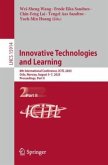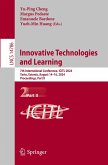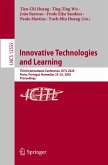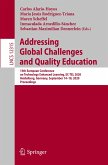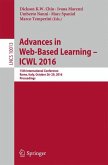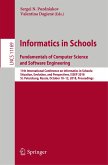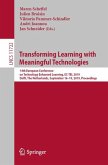Innovative Technologies and Learning
8th International Conference, ICITL 2025, Oslo, Norway, August 5-7, 2025, Proceedings, Part I
Herausgegeben:Wang, Wei-Sheng; Sandnes, Frode Eika; Lai, Chin-Feng; Sandtrø, Tengel Aas; Huang, Yueh-Min
Innovative Technologies and Learning
8th International Conference, ICITL 2025, Oslo, Norway, August 5-7, 2025, Proceedings, Part I
Herausgegeben:Wang, Wei-Sheng; Sandnes, Frode Eika; Lai, Chin-Feng; Sandtrø, Tengel Aas; Huang, Yueh-Min
- Broschiertes Buch
- Merkliste
- Auf die Merkliste
- Bewerten Bewerten
- Teilen
- Produkt teilen
- Produkterinnerung
- Produkterinnerung
The two-volume set, LNCS 15913 and 15914, constitutes the refereed conference proceedings of the 8th International Conference on Innovative Technologies and Learning, ICITL 2025, held in Oslo, Norway, during August 5 7, 2025.
The 82 papers included in these proceedings were carefully reviewed and selected from 214 submissions. The papers are organized in the following topical sections:
Part I: Artificial Intelligence in Education; Computational Thinking in Education; Design and Framework of Learning Systems; VR/AR/MR/XR in Education.
Part II: Pedagogies to Innovative Technologies and…mehr
Andere Kunden interessierten sich auch für
![Innovative Technologies and Learning Innovative Technologies and Learning]() Innovative Technologies and Learning98,99 €
Innovative Technologies and Learning98,99 €![Innovative Technologies and Learning Innovative Technologies and Learning]() Innovative Technologies and Learning49,99 €
Innovative Technologies and Learning49,99 €![Innovative Technologies and Learning Innovative Technologies and Learning]() Innovative Technologies and Learning76,99 €
Innovative Technologies and Learning76,99 €![Addressing Global Challenges and Quality Education Addressing Global Challenges and Quality Education]() Addressing Global Challenges and Quality Education61,99 €
Addressing Global Challenges and Quality Education61,99 €![Advances in Web-Based Learning - ICWL 2016 Advances in Web-Based Learning - ICWL 2016]() Advances in Web-Based Learning - ICWL 201638,99 €
Advances in Web-Based Learning - ICWL 201638,99 €![Informatics in Schools. Fundamentals of Computer Science and Software Engineering Informatics in Schools. Fundamentals of Computer Science and Software Engineering]() Informatics in Schools. Fundamentals of Computer Science and Software Engineering38,99 €
Informatics in Schools. Fundamentals of Computer Science and Software Engineering38,99 €![Transforming Learning with Meaningful Technologies Transforming Learning with Meaningful Technologies]() Transforming Learning with Meaningful Technologies76,99 €
Transforming Learning with Meaningful Technologies76,99 €-
-
-
The two-volume set, LNCS 15913 and 15914, constitutes the refereed conference proceedings of the 8th International Conference on Innovative Technologies and Learning, ICITL 2025, held in Oslo, Norway, during August 5 7, 2025.
The 82 papers included in these proceedings were carefully reviewed and selected from 214 submissions. The papers are organized in the following topical sections:
Part I: Artificial Intelligence in Education; Computational Thinking in Education; Design and Framework of Learning Systems; VR/AR/MR/XR in Education.
Part II: Pedagogies to Innovative Technologies and Learning; STEM/STEAM Education; Application and Design of Generative Artificial Intelligence in Education.
The 82 papers included in these proceedings were carefully reviewed and selected from 214 submissions. The papers are organized in the following topical sections:
Part I: Artificial Intelligence in Education; Computational Thinking in Education; Design and Framework of Learning Systems; VR/AR/MR/XR in Education.
Part II: Pedagogies to Innovative Technologies and Learning; STEM/STEAM Education; Application and Design of Generative Artificial Intelligence in Education.
Produktdetails
- Produktdetails
- Lecture Notes in Computer Science 15913
- Verlag: Springer / Springer Nature Switzerland / Springer, Berlin
- Artikelnr. des Verlages: 978-3-031-98184-5
- Seitenzahl: 408
- Erscheinungstermin: 15. Juli 2025
- Englisch
- Abmessung: 235mm x 155mm x 23mm
- Gewicht: 616g
- ISBN-13: 9783031981845
- ISBN-10: 3031981847
- Artikelnr.: 74330103
- Herstellerkennzeichnung
- Springer-Verlag KG
- Sachsenplatz 4-6
- 1201 Wien, AT
- ProductSafety@springernature.com
- Lecture Notes in Computer Science 15913
- Verlag: Springer / Springer Nature Switzerland / Springer, Berlin
- Artikelnr. des Verlages: 978-3-031-98184-5
- Seitenzahl: 408
- Erscheinungstermin: 15. Juli 2025
- Englisch
- Abmessung: 235mm x 155mm x 23mm
- Gewicht: 616g
- ISBN-13: 9783031981845
- ISBN-10: 3031981847
- Artikelnr.: 74330103
- Herstellerkennzeichnung
- Springer-Verlag KG
- Sachsenplatz 4-6
- 1201 Wien, AT
- ProductSafety@springernature.com
.- Artificial Intelligence in Education.
.- AI Tools for English Proficiency Test Preparation: A Research Review.
.- Enhancing Social Adaptation in Young Learners Through a 2-Year Multimedia Program on Social-Emotional Learning.
.- To Learn or Not to Learn Artificial Intelligence: An Anticipated Regret-Extended Expectancy-Value Theory.
.- Improving Learning to Cross-Lingual Question Answering via Performance Enhancement with XLM-R+ model.
.- Drawing for You: Exploring the Impact of Integrating Educational Technology into Picture Book Creation on Students Understanding of Special Education.
.- AI-Enhanced Augmented Reality for L2 Medical English Learning and Remote Surgical Collaboration.
.- AI-driven Constructivist Framework, in Child Welfare and Social Work Education.
.- Teaching AI Textual Interpretation: A Catalyst for Enhanced Literary Skills.
.- Lesson Plan Designing in the Digital Age: A Multimodal Approach with ChatGPT.
.- GenAI Chatbot Tutors as Agents of Inclusive Education: A Review Guided by Ethics of Care and Critical Pedagogy.
.- Postgraduate students perspective of Generative Artificial Intelligence for learning.
.- The Impact of AI-Generated and Non-AI-Generated Images on Learning Outcomes and Attitudes: A Case Study of Visual Narrative in Elementary School English Curriculum.
.- From Technology Acceptance to Teaching Practice: Exploring Pre-Service Teachers' User Typologies and Training Needs in ChatGPT Adoption.
.- Adaptive Auto-Prompting in Inquiry-Based Learning: Enhancing Curiosity and Learning Engagement to Improve Higher-Order Thinking.
.- ChatGPT-assisted Escape Room:Preservice teacher preparation for Generative Artificial Intelligence Enhanced Instructional Design.
.- STEMChat: Investigating Student Perceptions of ChatGPT-Based Mobile Instant Messaging in Collaborative STEM Learning.
.- Enhancing the Development of Higher Order Thinking in Beginners Through Creative Guided GPT.
.- Exploring the impact of using GenAI applications on MIS students' learning in system analysis.
.- AI-Supported Summative Reflection to Foster Motivation and Teamwork in STEM: An Application of the 6E+R Framework
.- The Impact of Generated AI-Supported Learning on Elementary Students Writing Skills.
.- Computational Thinking in Education.
.- A Study on the Effectiveness of Integrating Innovative Learning Strategies into Computational Thinking in Programming Learning for Non-CS Major Students.
.- Design and Framework of Learning Systems.
.- Which Students Collaborate? Unsupervised Identification of Team Structures from Individual Reports Documenting Groupwork.
.- Exploring the Factors Affecting Student s Online Assessing Peers Ability Continuance Intention as the Mediator.
.- Web Scraping and its use for teaching in course Information Systems in Tourism.
.- Extending eMath4All Platform to Broaden Applicability, Enrich Learning Experience and Enhance Teacher Support
.- Evaluating Cognitive Learning Hierarchies of LLM-created Assessment Questions in Engineering Education.
.- A Learning Analytics Framework for Higher Education in South Africa
.- Play My Math: Design and Implementation of a Fraction Generator Tool within a Mathematical Musician Digital Learning Platform.
.- Experiences with a Pragmatic Student Attendance Management Scheme.
.- Bridging the Digital Divide: User Interface Design Principles for Enhancing Elderly Learners' Engagement with Educational Technology
.- VR/AR/MR/XR in Education.
.- Evaluation of the Effectiveness of Integrating Virtual Reality with Goal-Based Scenario Learning Theory in Tree Risk Assessment.
.- Implementation and Validation of the Innovative VR Distance Learning System with Simulated Physical Interaction Functions and Target Language Learning
.- Influence of Red and Blue Virtual Environments During a Listening Evaluation: A Preliminary Study of Academic Performance and Subjective Self-perception
.- Non-Immersive Virtual Learning Environments (VLEs) with XR Elements in Nursing Education: Learning Interaction and Clinical Competence
.- A Virtual Reality-Based Co-Creation Approach to Developing Narrative Competence and Empathy in EFL Nursing Education.
.- The Impact of Virtual Art Exhibitions on Achievement Motivation and Technology Acceptance: A Case Study of Upper-Grade Elementary Students in Rural Areas.
.- From Peer Educators to Digital Change Agents: Rethinking Health Education through VR-Enhanced Peer Learning.
.- Personalized Feedback in VR Hands-on Learning: Tiered Support Based on Adaptive Learning Mechanisms.
.- Enhancing Higher-Order Thinking and Hands-On Performance in VR Learning Environments through CTML-Based Feedback Design.
.- AI Tools for English Proficiency Test Preparation: A Research Review.
.- Enhancing Social Adaptation in Young Learners Through a 2-Year Multimedia Program on Social-Emotional Learning.
.- To Learn or Not to Learn Artificial Intelligence: An Anticipated Regret-Extended Expectancy-Value Theory.
.- Improving Learning to Cross-Lingual Question Answering via Performance Enhancement with XLM-R+ model.
.- Drawing for You: Exploring the Impact of Integrating Educational Technology into Picture Book Creation on Students Understanding of Special Education.
.- AI-Enhanced Augmented Reality for L2 Medical English Learning and Remote Surgical Collaboration.
.- AI-driven Constructivist Framework, in Child Welfare and Social Work Education.
.- Teaching AI Textual Interpretation: A Catalyst for Enhanced Literary Skills.
.- Lesson Plan Designing in the Digital Age: A Multimodal Approach with ChatGPT.
.- GenAI Chatbot Tutors as Agents of Inclusive Education: A Review Guided by Ethics of Care and Critical Pedagogy.
.- Postgraduate students perspective of Generative Artificial Intelligence for learning.
.- The Impact of AI-Generated and Non-AI-Generated Images on Learning Outcomes and Attitudes: A Case Study of Visual Narrative in Elementary School English Curriculum.
.- From Technology Acceptance to Teaching Practice: Exploring Pre-Service Teachers' User Typologies and Training Needs in ChatGPT Adoption.
.- Adaptive Auto-Prompting in Inquiry-Based Learning: Enhancing Curiosity and Learning Engagement to Improve Higher-Order Thinking.
.- ChatGPT-assisted Escape Room:Preservice teacher preparation for Generative Artificial Intelligence Enhanced Instructional Design.
.- STEMChat: Investigating Student Perceptions of ChatGPT-Based Mobile Instant Messaging in Collaborative STEM Learning.
.- Enhancing the Development of Higher Order Thinking in Beginners Through Creative Guided GPT.
.- Exploring the impact of using GenAI applications on MIS students' learning in system analysis.
.- AI-Supported Summative Reflection to Foster Motivation and Teamwork in STEM: An Application of the 6E+R Framework
.- The Impact of Generated AI-Supported Learning on Elementary Students Writing Skills.
.- Computational Thinking in Education.
.- A Study on the Effectiveness of Integrating Innovative Learning Strategies into Computational Thinking in Programming Learning for Non-CS Major Students.
.- Design and Framework of Learning Systems.
.- Which Students Collaborate? Unsupervised Identification of Team Structures from Individual Reports Documenting Groupwork.
.- Exploring the Factors Affecting Student s Online Assessing Peers Ability Continuance Intention as the Mediator.
.- Web Scraping and its use for teaching in course Information Systems in Tourism.
.- Extending eMath4All Platform to Broaden Applicability, Enrich Learning Experience and Enhance Teacher Support
.- Evaluating Cognitive Learning Hierarchies of LLM-created Assessment Questions in Engineering Education.
.- A Learning Analytics Framework for Higher Education in South Africa
.- Play My Math: Design and Implementation of a Fraction Generator Tool within a Mathematical Musician Digital Learning Platform.
.- Experiences with a Pragmatic Student Attendance Management Scheme.
.- Bridging the Digital Divide: User Interface Design Principles for Enhancing Elderly Learners' Engagement with Educational Technology
.- VR/AR/MR/XR in Education.
.- Evaluation of the Effectiveness of Integrating Virtual Reality with Goal-Based Scenario Learning Theory in Tree Risk Assessment.
.- Implementation and Validation of the Innovative VR Distance Learning System with Simulated Physical Interaction Functions and Target Language Learning
.- Influence of Red and Blue Virtual Environments During a Listening Evaluation: A Preliminary Study of Academic Performance and Subjective Self-perception
.- Non-Immersive Virtual Learning Environments (VLEs) with XR Elements in Nursing Education: Learning Interaction and Clinical Competence
.- A Virtual Reality-Based Co-Creation Approach to Developing Narrative Competence and Empathy in EFL Nursing Education.
.- The Impact of Virtual Art Exhibitions on Achievement Motivation and Technology Acceptance: A Case Study of Upper-Grade Elementary Students in Rural Areas.
.- From Peer Educators to Digital Change Agents: Rethinking Health Education through VR-Enhanced Peer Learning.
.- Personalized Feedback in VR Hands-on Learning: Tiered Support Based on Adaptive Learning Mechanisms.
.- Enhancing Higher-Order Thinking and Hands-On Performance in VR Learning Environments through CTML-Based Feedback Design.
.- Artificial Intelligence in Education.
.- AI Tools for English Proficiency Test Preparation: A Research Review.
.- Enhancing Social Adaptation in Young Learners Through a 2-Year Multimedia Program on Social-Emotional Learning.
.- To Learn or Not to Learn Artificial Intelligence: An Anticipated Regret-Extended Expectancy-Value Theory.
.- Improving Learning to Cross-Lingual Question Answering via Performance Enhancement with XLM-R+ model.
.- Drawing for You: Exploring the Impact of Integrating Educational Technology into Picture Book Creation on Students Understanding of Special Education.
.- AI-Enhanced Augmented Reality for L2 Medical English Learning and Remote Surgical Collaboration.
.- AI-driven Constructivist Framework, in Child Welfare and Social Work Education.
.- Teaching AI Textual Interpretation: A Catalyst for Enhanced Literary Skills.
.- Lesson Plan Designing in the Digital Age: A Multimodal Approach with ChatGPT.
.- GenAI Chatbot Tutors as Agents of Inclusive Education: A Review Guided by Ethics of Care and Critical Pedagogy.
.- Postgraduate students perspective of Generative Artificial Intelligence for learning.
.- The Impact of AI-Generated and Non-AI-Generated Images on Learning Outcomes and Attitudes: A Case Study of Visual Narrative in Elementary School English Curriculum.
.- From Technology Acceptance to Teaching Practice: Exploring Pre-Service Teachers' User Typologies and Training Needs in ChatGPT Adoption.
.- Adaptive Auto-Prompting in Inquiry-Based Learning: Enhancing Curiosity and Learning Engagement to Improve Higher-Order Thinking.
.- ChatGPT-assisted Escape Room:Preservice teacher preparation for Generative Artificial Intelligence Enhanced Instructional Design.
.- STEMChat: Investigating Student Perceptions of ChatGPT-Based Mobile Instant Messaging in Collaborative STEM Learning.
.- Enhancing the Development of Higher Order Thinking in Beginners Through Creative Guided GPT.
.- Exploring the impact of using GenAI applications on MIS students' learning in system analysis.
.- AI-Supported Summative Reflection to Foster Motivation and Teamwork in STEM: An Application of the 6E+R Framework
.- The Impact of Generated AI-Supported Learning on Elementary Students Writing Skills.
.- Computational Thinking in Education.
.- A Study on the Effectiveness of Integrating Innovative Learning Strategies into Computational Thinking in Programming Learning for Non-CS Major Students.
.- Design and Framework of Learning Systems.
.- Which Students Collaborate? Unsupervised Identification of Team Structures from Individual Reports Documenting Groupwork.
.- Exploring the Factors Affecting Student s Online Assessing Peers Ability Continuance Intention as the Mediator.
.- Web Scraping and its use for teaching in course Information Systems in Tourism.
.- Extending eMath4All Platform to Broaden Applicability, Enrich Learning Experience and Enhance Teacher Support
.- Evaluating Cognitive Learning Hierarchies of LLM-created Assessment Questions in Engineering Education.
.- A Learning Analytics Framework for Higher Education in South Africa
.- Play My Math: Design and Implementation of a Fraction Generator Tool within a Mathematical Musician Digital Learning Platform.
.- Experiences with a Pragmatic Student Attendance Management Scheme.
.- Bridging the Digital Divide: User Interface Design Principles for Enhancing Elderly Learners' Engagement with Educational Technology
.- VR/AR/MR/XR in Education.
.- Evaluation of the Effectiveness of Integrating Virtual Reality with Goal-Based Scenario Learning Theory in Tree Risk Assessment.
.- Implementation and Validation of the Innovative VR Distance Learning System with Simulated Physical Interaction Functions and Target Language Learning
.- Influence of Red and Blue Virtual Environments During a Listening Evaluation: A Preliminary Study of Academic Performance and Subjective Self-perception
.- Non-Immersive Virtual Learning Environments (VLEs) with XR Elements in Nursing Education: Learning Interaction and Clinical Competence
.- A Virtual Reality-Based Co-Creation Approach to Developing Narrative Competence and Empathy in EFL Nursing Education.
.- The Impact of Virtual Art Exhibitions on Achievement Motivation and Technology Acceptance: A Case Study of Upper-Grade Elementary Students in Rural Areas.
.- From Peer Educators to Digital Change Agents: Rethinking Health Education through VR-Enhanced Peer Learning.
.- Personalized Feedback in VR Hands-on Learning: Tiered Support Based on Adaptive Learning Mechanisms.
.- Enhancing Higher-Order Thinking and Hands-On Performance in VR Learning Environments through CTML-Based Feedback Design.
.- AI Tools for English Proficiency Test Preparation: A Research Review.
.- Enhancing Social Adaptation in Young Learners Through a 2-Year Multimedia Program on Social-Emotional Learning.
.- To Learn or Not to Learn Artificial Intelligence: An Anticipated Regret-Extended Expectancy-Value Theory.
.- Improving Learning to Cross-Lingual Question Answering via Performance Enhancement with XLM-R+ model.
.- Drawing for You: Exploring the Impact of Integrating Educational Technology into Picture Book Creation on Students Understanding of Special Education.
.- AI-Enhanced Augmented Reality for L2 Medical English Learning and Remote Surgical Collaboration.
.- AI-driven Constructivist Framework, in Child Welfare and Social Work Education.
.- Teaching AI Textual Interpretation: A Catalyst for Enhanced Literary Skills.
.- Lesson Plan Designing in the Digital Age: A Multimodal Approach with ChatGPT.
.- GenAI Chatbot Tutors as Agents of Inclusive Education: A Review Guided by Ethics of Care and Critical Pedagogy.
.- Postgraduate students perspective of Generative Artificial Intelligence for learning.
.- The Impact of AI-Generated and Non-AI-Generated Images on Learning Outcomes and Attitudes: A Case Study of Visual Narrative in Elementary School English Curriculum.
.- From Technology Acceptance to Teaching Practice: Exploring Pre-Service Teachers' User Typologies and Training Needs in ChatGPT Adoption.
.- Adaptive Auto-Prompting in Inquiry-Based Learning: Enhancing Curiosity and Learning Engagement to Improve Higher-Order Thinking.
.- ChatGPT-assisted Escape Room:Preservice teacher preparation for Generative Artificial Intelligence Enhanced Instructional Design.
.- STEMChat: Investigating Student Perceptions of ChatGPT-Based Mobile Instant Messaging in Collaborative STEM Learning.
.- Enhancing the Development of Higher Order Thinking in Beginners Through Creative Guided GPT.
.- Exploring the impact of using GenAI applications on MIS students' learning in system analysis.
.- AI-Supported Summative Reflection to Foster Motivation and Teamwork in STEM: An Application of the 6E+R Framework
.- The Impact of Generated AI-Supported Learning on Elementary Students Writing Skills.
.- Computational Thinking in Education.
.- A Study on the Effectiveness of Integrating Innovative Learning Strategies into Computational Thinking in Programming Learning for Non-CS Major Students.
.- Design and Framework of Learning Systems.
.- Which Students Collaborate? Unsupervised Identification of Team Structures from Individual Reports Documenting Groupwork.
.- Exploring the Factors Affecting Student s Online Assessing Peers Ability Continuance Intention as the Mediator.
.- Web Scraping and its use for teaching in course Information Systems in Tourism.
.- Extending eMath4All Platform to Broaden Applicability, Enrich Learning Experience and Enhance Teacher Support
.- Evaluating Cognitive Learning Hierarchies of LLM-created Assessment Questions in Engineering Education.
.- A Learning Analytics Framework for Higher Education in South Africa
.- Play My Math: Design and Implementation of a Fraction Generator Tool within a Mathematical Musician Digital Learning Platform.
.- Experiences with a Pragmatic Student Attendance Management Scheme.
.- Bridging the Digital Divide: User Interface Design Principles for Enhancing Elderly Learners' Engagement with Educational Technology
.- VR/AR/MR/XR in Education.
.- Evaluation of the Effectiveness of Integrating Virtual Reality with Goal-Based Scenario Learning Theory in Tree Risk Assessment.
.- Implementation and Validation of the Innovative VR Distance Learning System with Simulated Physical Interaction Functions and Target Language Learning
.- Influence of Red and Blue Virtual Environments During a Listening Evaluation: A Preliminary Study of Academic Performance and Subjective Self-perception
.- Non-Immersive Virtual Learning Environments (VLEs) with XR Elements in Nursing Education: Learning Interaction and Clinical Competence
.- A Virtual Reality-Based Co-Creation Approach to Developing Narrative Competence and Empathy in EFL Nursing Education.
.- The Impact of Virtual Art Exhibitions on Achievement Motivation and Technology Acceptance: A Case Study of Upper-Grade Elementary Students in Rural Areas.
.- From Peer Educators to Digital Change Agents: Rethinking Health Education through VR-Enhanced Peer Learning.
.- Personalized Feedback in VR Hands-on Learning: Tiered Support Based on Adaptive Learning Mechanisms.
.- Enhancing Higher-Order Thinking and Hands-On Performance in VR Learning Environments through CTML-Based Feedback Design.


